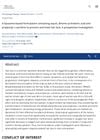1 citations,
June 2019 in “Current Developments in Nutrition” S-equol supplements significantly reduced menopausal symptoms in most women.
 10 citations,
October 2018 in “Dermatologic Therapy”
10 citations,
October 2018 in “Dermatologic Therapy” The lotion with equol, dihomo-γ-linolenic acid, and propionyl-l-carnitine was effective in reducing hair loss in men and women.
 December 2023 in “Scientific reports”
December 2023 in “Scientific reports” Fermented soy protein may help prevent bone loss by affecting bone cell activity.
 26 citations,
May 2021 in “International Journal of Molecular Sciences”
26 citations,
May 2021 in “International Journal of Molecular Sciences” Cheonggukjang may help prevent and manage various diseases and improve overall health, but its odor and safety concerns need addressing.
 150 citations,
April 2013 in “Dermato-endocrinology”
150 citations,
April 2013 in “Dermato-endocrinology” Estrogen therapy can reduce skin aging but has cancer risks.
 77 citations,
May 2012 in “Expert Opinion on Emerging Drugs”
77 citations,
May 2012 in “Expert Opinion on Emerging Drugs” New treatments for male hypogonadism are effective and should be personalized.
13 citations,
May 2021 in “FASEB bioAdvances” Plant-based products can improve hair and skin health without harmful side effects.
 68 citations,
June 2005 in “Expert Opinion on Therapeutic Targets”
68 citations,
June 2005 in “Expert Opinion on Therapeutic Targets” Oestrogens help maintain healthy skin, heal wounds, and may protect against skin aging and cancer.
 November 2023 in “Research journal of pharmacy and technology”
November 2023 in “Research journal of pharmacy and technology” Medicinal plants may effectively treat hair loss.
2 citations,
June 2023 in “Journal of clinical medicine” Soy supplements improve various skin conditions and aging signs, with topical use boosting skin barrier function.
3 citations,
October 2023 in “Cosmetics” Healthy lifestyle changes can significantly improve skin health as you age.
 2 citations,
July 2023 in “International Journal of Molecular Sciences”
2 citations,
July 2023 in “International Journal of Molecular Sciences” BFNB could be a promising treatment for hair growth.
 61 citations,
January 2018 in “Cosmetics”
61 citations,
January 2018 in “Cosmetics” Coffee silverskin may be a beneficial and safe ingredient for cosmetics, offering hydration, firmness, and potential hair growth benefits.
 45 citations,
January 2020 in “Pharmaceutical Biology”
45 citations,
January 2020 in “Pharmaceutical Biology” Dendrobium officinale polysaccharides may help with hair growth, skin moisturization, and protection against oxidative damage.
 September 2023 in “Gynäkologische Endokrinologie”
September 2023 in “Gynäkologische Endokrinologie” Menopause causes skin and hair to become drier and thinner, but hormone therapy can improve these conditions.
 3 citations,
February 2019 in “Journal of Cosmetic Dermatology”
3 citations,
February 2019 in “Journal of Cosmetic Dermatology” The effects of estrogen on human scalp hair growth are unclear and need more research.
June 2024 in “Regenerative Therapy” Exosomes from stem cells may help rejuvenate skin and regrow hair, but more research is needed.
 8 citations,
March 2020 in “Dermatologic Therapy”
8 citations,
March 2020 in “Dermatologic Therapy” The new hair loss treatment kit was safe and improved hair growth without any adverse effects.
 284 citations,
February 2008 in “Pediatrics”
284 citations,
February 2008 in “Pediatrics” Chemicals and body size might change when puberty starts and progresses, but more research is needed to confirm this.

New treatments for hair loss should target eight main causes and use specific plant compounds and peptides for better results.
 16 citations,
September 2018 in “Journal of Ethnopharmacology”
16 citations,
September 2018 in “Journal of Ethnopharmacology” Plant-based remedies may treat hair loss by reducing inflammation and improving insulin resistance.
 67 citations,
January 2007 in “Climacteric”
67 citations,
January 2007 in “Climacteric” Estrogens and SERMs can help with skin aging, but their safety and effectiveness need more research.
 2 citations,
August 2020 in “Cosmetics”
2 citations,
August 2020 in “Cosmetics” Herbal formula shows promise for hair loss treatment.
 15 citations,
December 2013
15 citations,
December 2013 Men with more vanadium in their blood and who drink less soy milk are more likely to have hair loss.
 1 citations,
September 2013 in “Elsevier eBooks”
1 citations,
September 2013 in “Elsevier eBooks” Hair ages and thins due to factors like inflammation and stress, and treatments like antioxidants and hormones might improve hair health.
 May 2022 in “Pharmacognosy journal”
May 2022 in “Pharmacognosy journal” Moringa seed oil may help prevent hair loss and promote hair growth.
 January 2017 in “Springer eBooks”
January 2017 in “Springer eBooks” Eating a balanced diet with specific nutrients can help manage menopause symptoms and prevent related health issues.
 434 citations,
October 2003 in “PTR. Phytotherapy research/Phytotherapy research”
434 citations,
October 2003 in “PTR. Phytotherapy research/Phytotherapy research” Natural products in cosmetics are beneficial for skin and hair care with low toxicity.
 59 citations,
May 2014 in “Expert Opinion on Therapeutic Targets”
59 citations,
May 2014 in “Expert Opinion on Therapeutic Targets” The document concludes that targeting 5α-reductase, the androgen receptor, and hair growth genes, along with using compounds with anti-androgenic properties, could lead to more effective hair loss treatments.
 45 citations,
January 2020 in “International Journal of Molecular Sciences”
45 citations,
January 2020 in “International Journal of Molecular Sciences” Some natural compounds may help overcome drug resistance in certain cancers, but more research is needed.
























